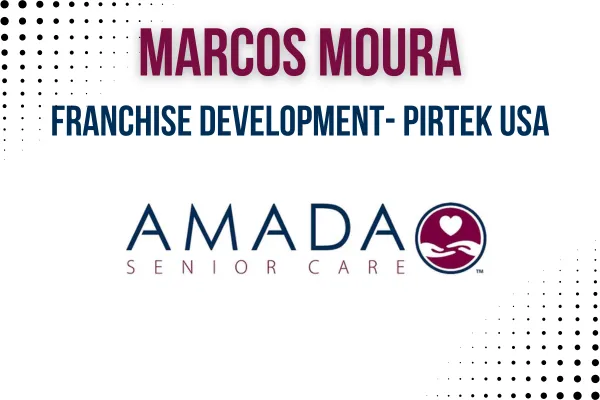
The 5 Most Important Lessons I Learned from Marcos Moura of Amada Senior Care
In-home non-medical home care is a massive, growing market. Amada Senior Care appears strong on training and support. But fit and execution matter more than the brand name. If this model doesn’t match your skills, you won’t win.
1) Get the model right (and the size of the ticket)
Home care ≠ home health. Home care is non-medical help at home (bathing, meals, toileting, transfers, light housekeeping, companionship).
Care blocks are long. Typical starts at ~5+ hours/day, several days per week; many cases go 24/7.
Revenue concentration is real. One round-the-clock client can be ~$25k/month.
Amada’s stack = 3 businesses:
Home care (~95% of revenue, per Marcos),
Senior placements (free to families; communities pay a placement fee),
Staffing (you recruit caregivers—and sometimes clinical roles like nurses—for facilities; you’re a recruiter, not a medical provider).
Why this matters: If you expected short visits and light scheduling, rethink it. This is an operations business with long shifts, complex scheduling, and high stakes for families.
2) You Get Customers By Helping the Senior, Not Selling (be an advocate, not a brochure)
Medicare does not pay for non-medical home care.
Real payers: Cash, Medicaid (state-dependent), VA benefits, Long-Term Care Insurance (LTCI).
Amada’s differentiator, per Marcos: help families unlock VA/LTCI money (they file claims and handle the admin). He said VA is roughly ~14% of billing in their system.
Why this matters: Hospitals and discharge planners don’t need “we have lovely caregivers.” They need fundable discharges. If you can secure the money pathway for families, you become the obvious partner.
3) Customer acquisition is 80/20 (relationships beat ads)
Roughly ~80% from referrals (hospitals, SNFs, assisted living communities, financial planners, elder-law attorneys, insurance agents).
About ~20% from paid search/online leads.
The pitch that works: “Send us veterans and LTCI cases—we will file and manage the benefits so your patient goes home with care and can afford it.”
Why this matters: If your default playbook is “buy leads and close on the phone,” you’ll be underweight on what actually drives volume and quality in this category—local referral relationships.
4) Your product is caregivers (recruit nonstop, retain through respect)
Recruiting is continuous. Marcos said they’ve hired weekly since 2008.
You cannot out-hire poor retention.
Caregivers consistently rank respect as the #1 thing they want (not pay, not hours). That means: predictable schedules, quick responses, genuine check-ins, solving problems when life happens, growth/training paths, and public recognition.
Why this matters: If you’re allergic to people management, this will be painful. If you love building teams and culture, you’ll have an edge.
5) Fit beats résumé (execution, not pedigree)
Backgrounds that perform vary (medical sales, retail operators, engineers). What wins: tenacity, people-first leadership, and what Amada calls being “confidently humble.”
Best path is full-time early. If you must start part-time, hire a full-time operator and reinvest—don’t starve the business.
Scale comes from depth in one market, then additional territories and/or staffing. Exits often go to other franchisees or new entrants; PE can work if they follow the agreement.
Why this matters: A big brand with strong support won’t fix a skills-mismatch. Own the parts of the job that actually move the numbers.
Who should consider Amada (or any top home-care brand)
You like relationship selling (hospital case managers, elder-law, planners).
You’re comfortable with benefits/claims workflows (VA, LTCI) or you’ll adopt them quickly.
You enjoy hiring, coaching, and retaining hourly teams.
You can execute daily, not chase shiny objects, and you’ll reinvest early profits.
Who should not
You want a mostly digital marketing customer engine.
You dislike field ops and people problems.
You hope for semi-absentee with minimal leadership.
You’re unwilling to learn payers and advocate for families.
Questions to validate in diligence (ask franchisor and franchisees)
Referrals: How many active hospital/SNF/AL relationships drive monthly starts? What activities create them?
Payers: What % of revenue is cash vs Medicaid vs VA vs LTCI in my state? Who files claims? What’s the cycle time to cash?
Caregivers: Monthly recruiting throughput? 90-day retention? Top 3 reasons for churn and how top owners mitigate them.
Unit economics: Average bill rate, typical margin after caregiver wages, bad debt %, ramp to breakeven, cash-flow timing with VA/LTCI.
Support: What training specifically covers hospital access, VA/LTCI filing, and caregiver retention systems? Show me the playbooks.
Bottom line
The industry is big and getting bigger.
Amada presents a clear operating playbook and emphasizes payer advocacy and referral-driven growth.
Success still comes down to fit: Can you build trusted local relationships and run a high-trust, high-respect caregiver organization—every week, without letting up?
If you want to explore Amada (or compare it to peers), I can walk you through the FDD, connect you to owners for validation, and pressure-test fit. My process is free to you (franchisors pay me if you sign), and the goal is simple: if it’s not your game, we don’t force it. www.tracerfranchising.com
